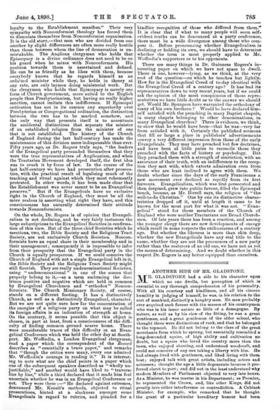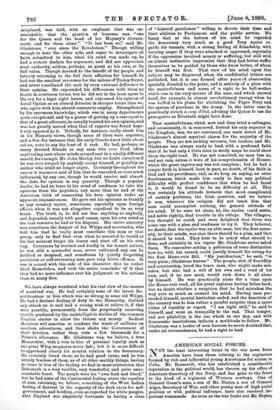ANOTHER SIDE OF MR.. GLADSTONE.
MR. GLADSTONE had a side to his character upon. which no one dwells, but perception of which is essential to any thorough comprehension of his personality. With all his courtesy and kindliness, and all his sincere humility in judging of himself, he was, in his relation to the rest of mankind, distinctly a haughty man. No man probably, ever acquired such favour with the masses of his countrymen. who was in his inner nature so little of a demagogue. By nature, as well as by his view of the fitting, he was a great gentleman, and a great gentleman of the older school, who thought there were distinctions of rank, and that he belonged to the topmost. He did not belong to the class of the great merchants from which he sprung, but essentially resembled a long-descended squire, of high ability and cultivation no doubt, but a squire who loved the country more than the town, who enjoyed shooting, and understood woodcraft, an& could not conceive of any one taking a liberty with him. He had always lived with gentlemen, and liked living with them best ; enjoyed talk with great artiste, including actors and actresses ; thought the age a little degenerate because it pre-- ferred claret to port; and did not in the least understand why modern Members of Parliament objected to very late hours. As a Minister, he was master in his Department; as Premier,. he represented the Crown, and, like other Kings, did not greatly love either interference or contradiction. A Cabinet. Minister, for example, who remarked that he thought the grant of a particular hereditary honour had been/
misplaced, was told, with an emphasis that was un- mistakable, that the question of honours was "one for the Queen and the head of her Majesty's Govern- ment, and for them alone." "It has been so," said Mr. Gladstone, "ever since the Revolution." Though willing enough to hear the other side, and eager to investigate all facts submitted to him, when his mind was made up, he had a certain disdain for argument, and did not appreciate rival authority, seldom, perhaps, as great as his own, at its full value. Though devoted to the benefit of the people, and latterly returning to the full their affection for himself, he had not the smallest reverence for the tailors of Tooley Street, and never conciliated the mob by even external deference to their opinion. He expounded his differences with them no doubt in courteous terms, but he did not in the least agree to the cry for a legal eight hours, and expressed his opinion of Local Option as an absurd delusion in sharper terms than we, who agree with him, should venture to employ. Strengthened by his enormous knowledge, which was in many departments quite exceptional, and by a power of getting up a case equal to that of a great advocate, he usually trusted his own opinion,and was not greatly moved when that of experts was found hope- 1,8sly opposed to it. Nobody, for instance, really shook him in his Homeric views, though some of them were separate, and a few, for instance that the early Greeks knew little about colour, were to say the least of it rash. He had, perhaps, as many devoted friends as any man who ever lived, often captivating men whose minds seemed cast in a wholly different mould, for example Mr. John Morley, but we doubt ourselves if be was ever swayed by anybody except himself, or possibly an author who could no longer argue. Certainly throughout his career it was never said of him that he was ruled, or even much influenced, by any one, though he would receive and absorb the data for opinion in any quantity. Though a popular leader, he had no trace in his mind of readiness to take his opinions from the populace, any more than he had of the American trick of concealing his true opinion under an apparent impassiveness. He gave out his opinions as frankly as any country squire, sometimes, especially upon foreign affairs, when it was not altogether expedient to be so very frank. The truth is, he did not fear anything or anybody, and depended, usually with good reason, upon his own mind as the best resource he had at his disposal. His entire sincerity was sometimes the despair of his Whips and secretaries, who told him that he really must conciliate this man or that group, only to find that even when he assented he would at the last moment forget his lesson and start off on his own way. Courteous by instinct and kindly in his inmost nature, he was still a masterful man, never cultivated any one he disliked or despised, and sometimes by quietly forgetting ambitious or self-esteeming men gave very bitter offence. It was in accord with this side of his character that he rather liked Mamelukes, and with the entire remainder of it that they had no more influence over his judgment or his actions than so many flies.
We have always wondered what his real view of the masses of mankind was. He had certainly none of the latent Re- pablicanism in him which was so strong in some old Whigs. He had a distinct feeling of duty to the Monarchy, disliked any attack on it, and had a strong wish to relieve it, if that were possible, permanently from the perpetually recurring trouble produced by the unintelligible dislike of the common English elector to allow the throne any money. Radical Members will sanction or condone the waste of millions on needless adventures, and then shake the Government of their devotion rather than vote a few thousands for a Prince's allowance. Mr. Gladstone was, we believe, a true Monarchist, with a vein in him of personal loyalty such as the great Whig magnates never felt ; but it is more difficult to apprehend clearly his mental relation to the democracy. lie certainly loved them, as he had good cause, and he was utterly fearless of them, as of all other earthly things, having no trace in him of the feeling we find in most aristocrats, that Behemoth is a very terrible, very wonderful, and quite unac- countable beast. The people were his "own flesh and blood," but he had none of the Continental feeling about the equality of man, retaining, we believe, something of the West Indian feeling of distrust in the capacity of the dark races for self- government, and holding, even as regarded the white peoples, that England was singularly fortunate in having a class
of "leisured gentlemen" willing to devote their time and their abilities to Parliament and the public service. We fancy that at the bottom of his mind he regarded the democracy very much as a good Tory squire re- gards his tenants, with a strong feeling of friendship, with
burning anger if they were attacked or oppressed, especially if the oppression involved misery or suffering, but still with an almost instinctive impression that they had better suffer themselves to be guided by those who knew better, of whom he himself was first. That view of his mind upon this subject may be disproved when his confidential letters are published, but it is one formed after years of observation specially directed to the point, and is entirely of a piece with the masterfulness and sense of a right to be bell-wether which was in the very nature of the man, and which showed itself, for example, in almost revolutionary energy when he was baffled in his plans for abolishing the Paper Duty and the system of purchase in the Army. In the latter case he practically struck a coup d'gtat, advising the Queen to use the prerogative as Elizabeth might have done.
That masterfulness, which now and then tried a colleague, and occasionally, it is rumoured, fretted his only superior in the Kingdom, was, we are convinced, one main secret of Mr. Gladstone's almost mystical charm for the majority of the people. They are not seeking servants, but leaders, and Mr. Gladstone was always ready to lead, with a profound faith that if he had only a little time to study maps he could show them the right road. He was not conceited, no man less so, and not vain, unless it were of his comprehension of Homer, which the great experts say was not complete; but he had a simple faith in himself, born in part, no doubt, of his faith in God and his providence, and, as we keep on saying, an utter fearlessness, which made him ready to face any political difficulty with perfect confidence that when he had faced it, it would be found to be no difficulty at all. This was certainly his attitude towards that most complicated of earthly problems, the Irish question, and we believe it was, wherever his religion did not teach him that man could accomplish nothing, the general attitude of his mind. If he were let alone, he, the squire, could settle, and settle rightly, that trouble in the village. The villagers, too, thought he could, and were delighted that there was some one with a plan and readiness to try it. They believed, no doubt, that the squire VMS an able man, but the first neces- sity, to their minds, was that there should be a plan, and that it should be tried. They hate to be asked what should be done, and certainly in his vigour Mr. Gladstone never asked them. We remember asking a politician of some distinction how he, with his record, could justify himself for voting for the first Home-rule Bill. "My justification," he said, "is very plain; Gladstone knows." The people, sick of flaccidity and conrtiership, loved the brave man, who might make mis- takes, but who had a will of his own and a road of his own, and, if he saw need, would rush down it all alone by himself. He was practically alone for a time upon the Home-rule road, all his great captains having fallen back, but we doubt whether a suspicion that he had mistaken the way ever so much as crossed his mind. Having once per- suaded himself, mental hesitation ended, and the desertion of the country was to him rather a painful surprise than a cause either of timidity or regret. "I am right still," he said to himself, and went on tranquilly to the end. That temper, and not pliability, is the one which in our day, and with democratic institutions, induces a multitude to follow. Mr. Gladstone was a leader of men because he never doubted that, under all circumstances, he had a right to lead.



































 Previous page
Previous page